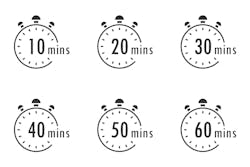4 Productivity Secrets of Successful HVAC Technicians
There are thousands of books on how to be productive, but if you want a crash course, look no further than our industry. There are thousands of books on how to be productive, but if you want a crash course, look no further than our industry. HVAC technicians are the most productive people you will find. They know how to prioritize their time and focus their attention. Let’s look at four secrets these specialists can teach us about improving our productivity.
One: Focus on One Thing
Many of us start our day with various tasks, pulling us in different directions. Some of these tasks are urgent, but others are distractions. Experienced HVAC technicians are masters at getting to what is essential during a service call. They must quickly determine what is important and what isn’t.
Skilled technicians focus on getting to the heart of a problem as quickly as possible. They won’t use every measurement and diagnostic procedure at their disposal. Instead, they focus their attention on the one thing preventing the HVAC system from keeping the customer comfortable. Once they identify it, they work towards a solution and maintain their focus until finished.
While this may sound simple in the field, it’s not. Drifting into distractions in both our professional and personal lives happens too easily. We can’t effectively focus on more than one priority at a time. As a result, we try to do too much at once and often end up accomplishing nothing. The sooner we accept this, the easier it is to get the important stuff done.
If you find yourself running in circles, stop trying to do everything at once. Instead, remember how technicians handle their calls. They focus on identifying and correcting the one key issue preventing the equipment from running. What if there are multiple things to consider? Make a list of them, and prioritize the most critical issue you need to complete first.
Two: Work in Time Blocks
Veteran technicians know that there are only a certain number of calls per day that they can complete. Smart scheduling allows a certain amount of time for various tasks in the day. The technician blocks out time so they can achieve their work with minimal distractions creeping in.
You can follow their example of time blocking to improve your productivity. Schedule time blocks in your calendar to get the essential things done. Make appointments with yourself and stick to them. To make the best use of time, restrict your availability during important time blocks. It’s estimated it takes 20 minutes to regain your momentum if you’re interrupted during your work.
For example, when I write, I turn off my smartphone and get it out of my office. There’s no temptation to answer phone calls, emails, or surf the internet with this distraction gone. I can work distraction-free in 60-minute and 90-minute time blocks. Once I’m done with the time block, I’ll address what I missed.
Be honest about what you can accomplish in a given amount of time. This helps you avoid unrealistic ideas about what you can get done. If you commit to more than you can do in a single day, you’ll become frustrated and overworking to meet goals you shouldn’t have set.
To avoid this temptation, leave time open for urgent events that suddenly pop up. Just as a no-cool call can turn into a half-day repair, you also need time to adjust. If you overbook your calendar, you’re no better off than if you didn’t block out times for important events.
Three: Organize Your Tools
If you look through the van of an extraordinary technician, you’ll notice how organized it is. Experienced technicians know where everything is and also have specific setups for specific tasks. There is a place for all their tools and test instruments.
For example, a skilled technician rarely carries every hand tool and test instrument for a service call. Instead, they have a diagnostic bag with the bare essentials to point them in the right direction. This bag often has nut drivers, needle-nose pliers, a small adjustable wrench, a six-in-one screwdriver, jumper wires, and an electrical multimeter.
From this small, organized set of tools, they gather the essential information needed to identify additional tools to continue their diagnosis. This setup keeps the technician from carrying unnecessary weight and allows easy equipment access.
Organization helps minimize wasted trips and increases your efficiency. Unless you’ve hauled a 50-pound tool bag up to a roof to diagnose a bad run capacitor, you may not appreciate how much of a difference this makes. Ninety-nine percent of what you took with you wasn’t needed.
You can apply the same logic to your workspace. How does it look? Is it clean and organized so that only the essential tools are in front of you, or is your desk covered with unnecessary clutter? Once you organize your desk, you’ll notice how quickly your work improves.
Four: Have a Process
Most experienced technicians have a process for handling a typical service call. They know what they will do before they arrive at the job site. While each process is a little different, these technicians have found what works best and keeps them from missing the obvious.
An older technician who mentored me had different points in his process that he would move to based on his discussion with the customer. Depending on their answers, he would start at the thermostat and turn the fan switch to the “on” position or go straight to the outdoor unit.
What was most important was that he had a process that I could learn from. There wasn’t a right or wrong process. It just depended on the call. Over the years, I adapted his process to become my own, which helped me avoid a lot of assumptions and windshield troubleshooting.
Extraordinary technicians also use a checklist to stay on track – they don’t work from memory. A checklist serves as a visual record of what to complete on each call. If you don’t think this document is essential, consider how every airline pilot completes a checklist before the plane takes off.
Part of staying productive and having a process is to use a planner to schedule your day. Planners combine your procedures and checklists into a single location that’s easy to reference. There are both digital and print options to choose from. This valuable tool can help you:
· Plan out your day
· Determine the one thing to focus on
· Block out time for important events
· Decide which tools you’ll need to accomplish your goals best.
Making the Application
It’s easy to get lost in the whirlwind of activity during the day. I’ve been guilty of it more times than I can count. Although it looked like I was busy, I wasn’t productive. Results matter, and they weren’t there.
When a technician completes a call, and the customer raves about the outcome, those results speak instantly. However, it’s often harder to see the results when you aren’t in the field. Instead, look for the small gains you make each day.
Let’s say it previously took you two hours to reply to emails while randomly scrolling social media. If you drop that time to 15 minutes with no social media distractions, that’s a successful outcome.
The transition from busy to productive won’t happen overnight. It will feel uncomfortable at first. You may initially feel a sense of guilt and want to respond to every unimportant incident. Fight this urge. Instead, focus on adding one of these productivity secrets to your day. I believe you’ll be pleased with how much more you accomplish.
David Richardson serves the HVAC industry as director of technical curriculum at National Comfort Institute, Inc. (NCI). NCI specializes in training that focuses on improving, measuring, and verifying HVAC and Building Performance.
If you’re an HVAC contractor or technician interested in learning more about serving your customers with airside testing better, contact David at ncilink.com/ContactMe or call 800-633-7058. NCI’s website www.nationalcomfortinstitute.com is full of free technical articles and downloads to help you improve your professionalism and strengthen your company.Let’s look at four secrets these specialists can teach us about improving our productivity.
1: Focus on One Thing
Many of us start our day with various tasks, pulling us in different directions. Some of these tasks are urgent, but others are distractions. Experienced HVAC technicians are masters at getting to what is essential during a service call. They must quickly determine what is important and what isn’t.
While this may sound simple in the field, it’s not. Drifting into distractions in both our professional and personal lives happens too easily. We can’t effectively focus on more than one priority at a time. As a result, we try to do too much at once and often end up accomplishing nothing. The sooner we accept this, the easier it is to get the important stuff done.
If you find yourself running in circles, stop trying to do everything at once. Instead, remember how technicians handle their calls. They focus on identifying and correcting the one key issue preventing the equipment from running. What if there are multiple things to consider? Make a list of them, and prioritize the most critical issue you need to complete first.
2: Work in Time Blocks
Veteran technicians know that there are only a certain number of calls per day that they can complete. Smart scheduling allows a certain amount of time for various tasks in the day. The technician blocks out time so they can achieve their work with minimal distractions creeping in.
You can follow their example of time blocking to improve your productivity. Schedule time blocks in your calendar to get the essential things done. MakeFor example, when I write, I turn off my smartphone and get it out of my office. There’s no temptation to answer phone calls, emails, or surf the internet with this distraction gone. I can work distraction-free in 60-minute and 90-minute time blocks. Once I’m done with the time block, I’ll address what I missed.
Be honest about what you can accomplish in a given amount of time. This helps you avoid unrealistic ideas about what you can get done. If you commit to more than you can do in a single day, you’ll become frustrated and overworking to meet goals you shouldn’t have set.
To avoid this temptation, leave time open for urgent events that suddenly pop up. Just as a no-cool call can turn into a half-day repair, you also need time to adjust. If you overbook your calendar, you’re no better off than if you didn’t block out times for important events.
3: Organize Your Tools
If you look through the van of an extraordinary technician, you’ll notice how organized it is. Experienced technicians know where everything is and also have specific setups for specific tasks. There is a place for all their tools and test instruments.
From this small, organized set of tools, they gather the essential information needed to identify additional tools to continue their diagnosis. This setup keeps the technician from carrying unnecessary weight and allows easy equipment access.
Organization helps minimize wasted trips and increases your efficiency. Unless you’ve hauled a 50-pound tool bag up to a roof to diagnose a bad run capacitor, you may not appreciate how much of a difference this makes. Ninety-nine percent of what you took with you wasn’t needed.
You can apply the same logic to your workspace. How does it look? Is it clean and organized so that only the essential tools are in front of you, or is your desk covered with unnecessary clutter? Once you organize your desk, you’ll notice how quickly your work improves.
4: Have a Process
Most experienced technicians have a process for handling a typical service call. They know what they will do before they arrive at the job site. While each process is a little different, these technicians have found what works best and keeps them from missing the obvious.
An older technician who mentored me had different points in his process that he would move to based on his discussion with the customer. Depending on their answers, he would start at the thermostat and turn the fan switch to the “on” position or go straight to the outdoor unit.
Extraordinary technicians also use a checklist to stay on track – they don’t work from memory. A checklist serves as a visual record of what to complete on each call. If you don’t think this document is essential, consider how every airline pilot completes a checklist before the plane takes off.
Part of staying productive and having a process is to use a planner to schedule your day. Planners combine your procedures and checklists into a single location that’s easy to reference. There are both digital and print options to choose from. This valuable tool can help you:
- Plan out your day
- Determine the one thing to focus on
- Block out time for important events
- Decide which tools you’ll need to accomplish your goals best.
Making the Application
It’s easy to get lost in the whirlwind of activity during the day. I’ve been guilty of it more times than I can count. Although it looked like I was busy, I wasn’t productive. Results matter, and they weren’t there.
When a technician completes a call, and the customer raves about the outcome, those results speak instantly. However, it’s often harder to see the results when you aren’t in the field. Instead, look for the small gains you make each day.
Let’s say it previously took you two hours to reply to emails while randomly scrolling social media. If you drop that time to 15 minutes with no social media distractions, that’s a successful outcome.
The transition from busy to productive won’t happen overnight. It will feel uncomfortable at first. You may initially feel a sense of guilt and want to respond to every unimportant incident. Fight this urge. Instead, focus on adding one of these productivity secrets to your day. I believe you’ll be pleased with how much more you accomplish.
David Richardson serves the HVAC industry as director of technical curriculum at National Comfort Institute, Inc. (NCI). NCI specializes in training that focuses on improving, measuring, and verifying HVAC and Building Performance.
If you’re an HVAC contractor or technician interested in learning more about serving your customers with airside testing better, contact David at ncilink.com/ContactMe or call 800-633-7058. NCI’s website www.nationalcomfortinstitute.com is full of free technical articles and downloads to help you improve your professionalism and strengthen your company.




